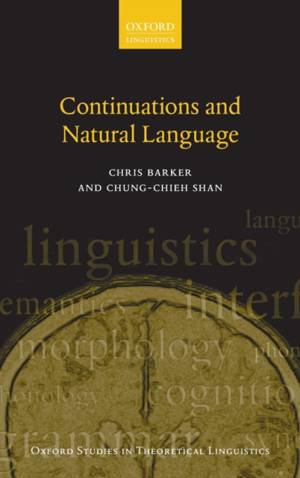
- Afhalen na 1 uur in een winkel met voorraad
- Gratis thuislevering in België vanaf € 30
- Ruim aanbod met 7 miljoen producten
- Afhalen na 1 uur in een winkel met voorraad
- Gratis thuislevering in België vanaf € 30
- Ruim aanbod met 7 miljoen producten
Zoeken
Omschrijving
This book takes concepts developed by researchers in theoretical computer science and adapts and applies them to the study of natural language meaning. Summarizing more than a decade of research, Chris Barker and Chung-chieh Shan put forward the Continuation Hypothesis: that the meaning of a natural language expression can depend on its own continuation. In Part I, the authors develop a continuation-based theory of scope and quantificational binding and provide an explanation for order sensitivity in scope-related phenomena such as scope ambiguity, crossover, superiority, reconstruction, negative polarity licensing, dynamic anaphora, and donkey anaphora. Part II outlines an innovative substructural logic for reasoning about continuations and proposes an analysis of the compositional semantics of adjectives such as 'same' in terms of parasitic and recursive scope. It also shows that certain cases of ellipsis should be treated as anaphora to a continuation, leading to a new explanation for a subtype of sluicing known as sprouting.
Specificaties
Betrokkenen
- Auteur(s):
- Uitgeverij:
Inhoud
- Aantal bladzijden:
- 252
- Taal:
- Engels
- Reeks:
Eigenschappen
- Productcode (EAN):
- 9780199575015
- Verschijningsdatum:
- 27/01/2015
- Uitvoering:
- Hardcover
- Formaat:
- Genaaid
- Afmetingen:
- 163 mm x 234 mm
- Gewicht:
- 539 g

Alleen bij Standaard Boekhandel
+ 467 punten op je klantenkaart van Standaard Boekhandel
Beoordelingen
We publiceren alleen reviews die voldoen aan de voorwaarden voor reviews. Bekijk onze voorwaarden voor reviews.







